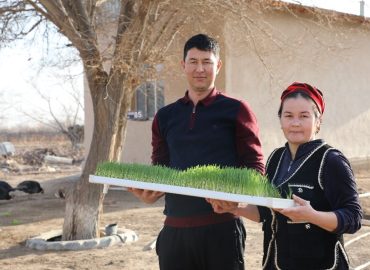Aquaponics Microfarm
New local microfarm will produce baby salad greens and rainbow trout
Lacroix Aquaponics in Ware Township will go into production in the coming months
Aquaponics Microfarm | Gary Rinne |
IMAGE: Thunder Bay-Atikokan MPP Kevin Holland, left, announced a Northern Ontario Heritage Fund Corporation investment of $192,000 in Lacroix Aquaponics on June 27, 2023 (submitted photo)
THUNDER BAY — A micro-farm that combines aquaculture and hydroponics will begin production in the coming months in Ware Township.
Patrick Lacroix and Shelly Poluchowicz don’t have a background in aquaponics, but what they do have is plenty of enthusiasm and a drive to make their innovative and sustainable agricultural venture succeed.
Thanks in part to a recent $192,000 investment by the Northern Ontario Heritage Fund Corporation, in the coming months they expect to be producing leafy specialty baby greens and rainbow trout on a year-round basis.
When the COVID-19 pandemic arrived, the couple — both of whom have had long careers in the field of mental health care — began pondering ways to circumvent challenges to local food security posed by transportation issues, access and the rising cost of groceries.
Since they already loved gardening, it was perhaps no surprise that they paused their online scrolling at the topic of aquaponics.
“This was two-and-a-half years ago, and we started doing lots of research and studying, and we connected with some very important individuals from Waterfarmers Aquaponics in the Toronto area, who are specialists,” Lacroix said Tuesday in an interview.
He explained that aquaponics creates a closed-loop, self-sustaining ecosystem, in which fish waste serves as a natural fertilizer for plants, while the plants filter and purify the water for the fish.
“Basically, this symbiotic relationships maximizes efficiency and productivity. And it’s going to help us produce a consistent year-round supply of baby leaf greens, of which we’ll have several varieties, as well as the best rainbow trout you can eat.”
Poluchowicz added that this type of farming is pesticide-free, uses no fertilizer, emits zero discharges, has a 43 per cent lower carbon footprint, and uses 92 per cent less water than conventional farming.
“We’re hoping to at least start to create a sustainable food system in Northwestern Ontario. We have so many barriers to receiving healthy produce, especially during our seasonal constraints, and with climate change, supply chain issues and safety concerns as food is transported. We’re really excited about this.”
The couple has a 47-acre property, and an enclosed 1500-square-foot climate-controlled building that’s been under construction.
When it’s completed – likely next month – the facility will be equipped with state-of-the-art commercial aquaponics technology including an advanced oxygenation system and biological-based filtration.
They expect to initially harvest 250 pounds of baby greens about every 20 days, starting as early as September, and plan to have rainbow trout available for sale to the general public a little later.
Word has already gotten out.
“We’ve had so much interest from major restaurants in town, some of the grocery stores. There are also many, many individuals who want their regular weekly harvest. Once we have our website going, we’ll take it as it comes,” Lacroix said.
The couple also hopes to distribute their products through local markets.
“We’d like to go to the farmers’ markets, because the food security report indicated that is one of the more accessible areas for individuals who may not be able to shop at supermarkets,” Poluchowicz said.
They are being mentored by the Canadian-based director of commercial aquaponics with the Aquaponics Association, a group that promotes aquaponics technology around the world.
In the future, the couple hopes to do outreach and become a resource for other people, perhaps in partnership with schools to advance this kind of sustainable farming in the Thunder Bay area.
Lacroix noted that many aquaponics facilities are engaged in community teaching, including through high school science classes.
“When you’re dealing with chemistry, biology, physics, which is basically what you utilize in aquaponics farming, it’s also a very good tool for kids to learn about utilizing natural ecosystems.”
Original Article: https://www.tbnewswatch.com/lets-eat/new-local-microfarm-will-produce-baby-salad-greens-and-rainbow-trout-7203321
The post Aquaponics Microfarm appeared first on GROZINE.


